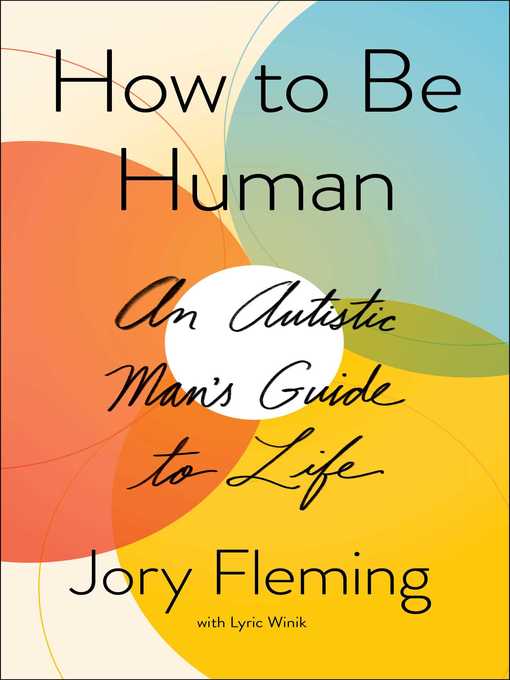
How to Be Human
An Autistic Man's Guide to Life
راهنمای زندگی یک فرد هنرمند
کتاب های مرتبط
- اطلاعات
- نقد و بررسی
- دیدگاه کاربران
نقد و بررسی

February 15, 2021
A deeply moving memoir from the first autistic student to attend Oxford as a Rhodes Scholar. Diagnosed with autism at age 5, Fleming has little memory of his life before age 11 or 12. As a child, he screamed for hours each day and never wanted to be more than a few feet from his mother. Eventually, with the aid of family, friends, and educators, the author, who "wasn't expected to graduate from high school," received a college degree and was named a Rhodes Scholar. At Oxford, he recently completed his master's degree in philosophy. In his debut book, Fleming tells his story to Winik, and the result is a fascinating deep dive into the murky waters of consciousness and identity. Because the author doesn't think about language like most people, he must translate information into his own code to understand it. He says he has "no idea" how other people process emotion, but he learned how to listen with empathy from a college leadership training manual. Whereas most people just "have" a personality, Fleming had to construct one: "serious and friendly and intellectual" but also "bubbly and dorky and witty." Fleming's rules for living spring from his Christian faith, and he believes that when it comes to solving the world's abiding problems, it's vital that we practice both "ruthless optimism" and "practical idealism." Winik interviewed Fleming multiple times and went through hundreds of pages of transcripts to help him shape the narrative, organizing the material in a Q&A fashion around chapters covering topics such as energy and memory, language barriers, and "things that matter." Never intrusive, she elegantly provides context for Fleming's brilliantly unique outlook. This tremendous work should be savored; every clearly written chapter offers fresh insight into how to shape a life from the inchoate matter of consciousness. Fleming's extraordinary journey will inspire any reader weighing what it means to be human in a troubled world.
COPYRIGHT(2021) Kirkus Reviews, ALL RIGHTS RESERVED.

April 1, 2021
In this debut, Fleming talks about what it's like to live in a society that was not designed for him. Despite the difficulties society imposes on him, and on others who live with autism, Fleming has thrived. He studied geography and marine science at the University of South Carolina and earned a Rhodes Scholarship to Oxford to continue his education. The words in this book are Fleming's; they have been organized by writer and editor Winik, who includes her own observations from her interactions with Fleming. Chapters feature a Q&A format, showing a conversation between two friends about personal experiences. Fleming often expresses his thoughts in vivid metaphors and imagery; he stresses that his experience is unique to him, and not representative of all autistic people. This comes across especially clearly where Fleming shares his preferences for terminology and his thoughts on disability advocacy. Perhaps the most affecting sections of the book focus on communication and language, and how words and body language can easily be misinterpreted. VERDICT A unique memoir showing the importance of diversity of thought. Fleming also makes clear the lasting impacts of language. An ideal complement to I Have Been Buried under Years of Dust, by Valerie Gilpeer and Emily Grodin.--Cate Triola, Capella Univ., Minneapolis
Copyright 2021 Library Journal, LLC Used with permission.

April 12, 2021
Fleming, a Rhodes Scholar who is on the autism spectrum, challenges societal assumptions around the subject in an illuminating extended conversation with writer Winik. Though Fleming struggles to process external stimuli that often overwhelm him—including the language and emotions of neurotypical people—he puts in extra effort to listen to and empathize with others, resulting in a "sophisticated and self-aware" approach that others might learn from. "The small number of us out there who think differently, whether it's from autism or some other reason, might have something valuable to bring to the discussion," Fleming writes. Autism has its advantages, he argues, including "not being easily influenced by emotion." Fleming also notes how, though it doesn't come naturally to him, he is sensitive to others' emotional needs and has a strong sense of public service, regarding himself as a "ruthless" optimist who believes "world problems, environmental problems, social problems" can be solved. Fleming sets a high bar, but he doesn't consider himself to be a role model. "I don't think role models are always a good idea, because everybody is unique." Fleming's insights intrigue and inspire. Agent: Binky Urban, ICM Partners.

























دیدگاه کاربران